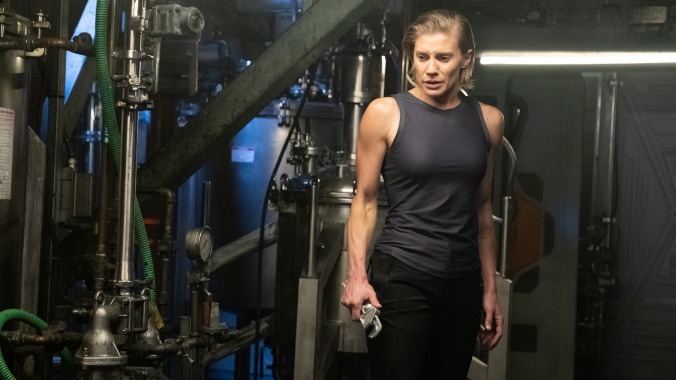Netflix sends Katee Sackhoff back into space with the messy sci-fi of Another Life


Katee Sackhoff is an awfully compelling actor. She’s got a talent for taking good material and elevating it into great performances—or, as anyone who saw her on the short-lived reboot of Bionic Woman can attest, injecting something watchable into lumpen disasters. Her career-making turn in Battlestar Galactica remains her best work, so it’s only natural someone would eventually put her back in a televised space opera. Who knows if Netflix’s famed algorithms were responsible for new series Another Life, where Sackhoff once more helps a desperate crew navigate encounters with a potentially dangerous interstellar antagonist, but the pairing of star and story are a natural fit. If only everything else about the series made as much sense.
Another Life is an unwieldy mashup of Arrival and any number of space-odyssey adventure serials, and struggles to maintain clarity or depth with either half of its bifurcated storyline. Sackhoff plays Niko Breckenridge, commander of the Salvare, the ship tasked with journeying to the distant planet from which a strange artifact that arrived on earth originated, the potential home of an unknown alien race that seems to have made first contact with humanity. Making her job more awkward is that fact she was assigned this world-altering task by displacing the Salvare’s former captain Ian Yerxa (Teen Wolf and Supergirl’s Tyler Hoechlin), who’s been demoted to her second-in-command despite the rest of his crew remaining in their jobs. The mission is to make contact and determine the aliens’ intentions, while trying not to let the problems encountered en route—or the pressure-cooker environment of the ship—screw up their task. The journey to the alien planet is partially broken into story-of-the-week episodes that sit uneasily with the overarching storyline, occasionally feeling more like strange distractions than episodic narratives.
Back on earth is the tale of Niko’s husband Erik (Shameless’ Justin Chatwin, doing his best with an underwritten role), who just so happens to be the scientist charged with figuring out a way to communicate with the massive crystalline artifact that plunged to earth in a field near his and Niko’s home where they’re raising their daughter. (Not the first coincidence, and painfully far from the least plausible one.) Early episodes allow for holographic communication between husband and wife, but that interesting tactic for keeping the two plots joined is soon abandoned when Earth loses contact with the Salvare. Erik’s mission is then wholly separate, and aside from some amusing scenes in which a nosy journalist (Selma Blair, having a ball hamming it up) starts trying to uncover the secrets of his project, it’s a lot of hemming and hawing at monitors and father-daughter conflict.
Netflix’s FX budget presumably is a cut above Syfy’s, so while the scripting and direction is decidedly B-movie cheese, the series at least presents an engaging visual framework to accompany the clunky dramatics. Shots of stars, space, and other interstellar imagery achieves an appropriately grandiose sense of scale and import. When the crew starts having to deal with things like alien parasites or a malfunctioning ship A.I., it’s effectively gruesome and technically polished in turn. It can’t quite match the razzle-dazzle aesthetic of Lost In Space, Netflix’s other ho-hum sci-fi series, but it doesn’t look generic. (The sound mix is another matter, with compression losing out to jarring rises and drops in decibel, making for some annoying punching of the volume control levels during viewing.)
Another factor in Another Life’s favor: It never once feels padded out. There’s none of the usual early-episode dithering so common to streaming series trying to meet an episode total they don’t have enough story to fill. The show mostly races from one adventure to the next, rarely catching its breath long enough to give the audience time to reflect on how slapdash or incoherent some of the narrative beats are. There are grisly deaths in the first few episodes alone that other series would save for the back half of a season.
Unfortunately, the series is too messy overall to get away with disguising its problems under a breakneck pace. It gets a little better as it progresses, but that’s only because the pilot is a bizarre amalgam of abrupt actions and character choices so nutty, they suggest that NASA failed to perform a single psychological evaluation on these people before launching them into space and pinning the hopes of all humanity on their success. Hoechlin’s subordinate performs a heel-turn so unjustified it throws the entire episode off track, and the show struggles to recover. Most supporting characters are defined by a single character trait: Jessica Camacho’s communications expert Michelle is an asshole who only appears capable of yelling at people and swearing in between every other word; Sasha (Jake Abel) is a wimp; Bernie (A.J. Rivera) is basically Hurley from Lost, but without the nuance; and so on. After the first few episodes, we still don’t really know any of these characters outside of Niko and Erik, and the time we do eventually spend with them isn’t much worth the wait.
The astronauts and earthbound alike tend to speak in either clumsy exposition or gratuitous personal reveals—subtlety is not Another Life’s strong suit. Which makes the episodes where it goes over the top with genre theatrics succeed far more than when it strives for unearned depth. A detour to a planet to replenish oxygen supplies leads to some fun body horror, and the eventual progress Erik makes with the artifact (the only part of the narrative that drags) leads to enjoyable-enough alien silliness. There’s even a scene that’s such a direct homage to Alien it’s probably closer to a ripoff, but at least interesting developments are happening onscreen.
Nitpicking sci-fi conceits is usually a waste of time (who cares how implausible a lovestruck robot fixing a ship’s FTL drive is?), but there are enough glaring omissions of logic in Another Life that it’s impossible not to get pulled out of the story at times. Humanity’s first alien artifact is so poorly guarded, Erik and his daughter can stroll right up to it for an afternoon outing. After lots of high-minded talk about the top-secret nature of his mission, Erik decides to bet revealing the hidden workings of his project on… a game of bar trivia. When the Salvare goes soaring through space, past a floating astronaut, the series adds sound effects of a roaring engine, you know, just like you’d hear in the airless void of space. Add to all this the disjuncture between the survival-of-the-species stakes and characters’ soap-opera behavior being often hard to square, and you’ve got a show that’s not very smart.
What the series does have is Sackhoff, and she’s more than up to the task of reminding the viewer why she’s anchoring this series. Whenever she’s onscreen, the show’s sophomoric writing instantly becomes more plausible, as she sells the hell out of the life-or-death drama. Seeing her expressive features react to these larger-than-life situations is to be reminded why she’s so good in sci-fi genre fare like this: She makes the ridiculous feel right. Hopefully Another Life will eventually bring itself up to her level, because its first season too often flails without her presence.